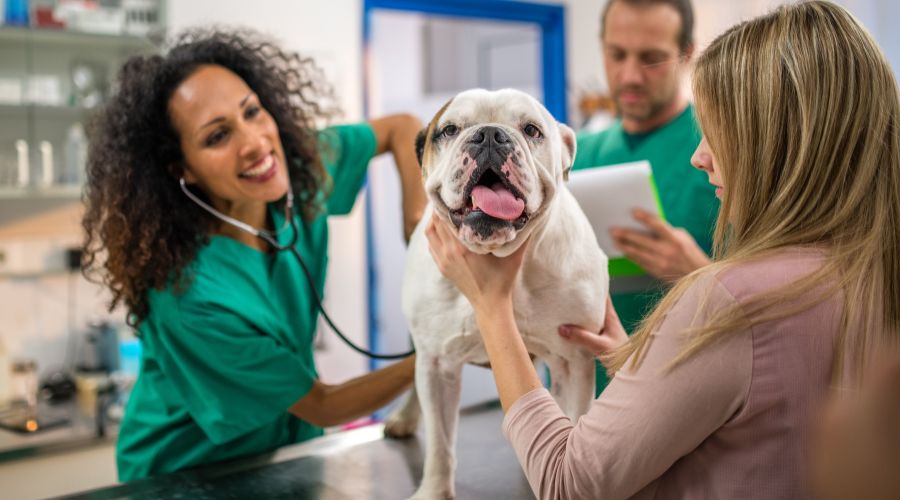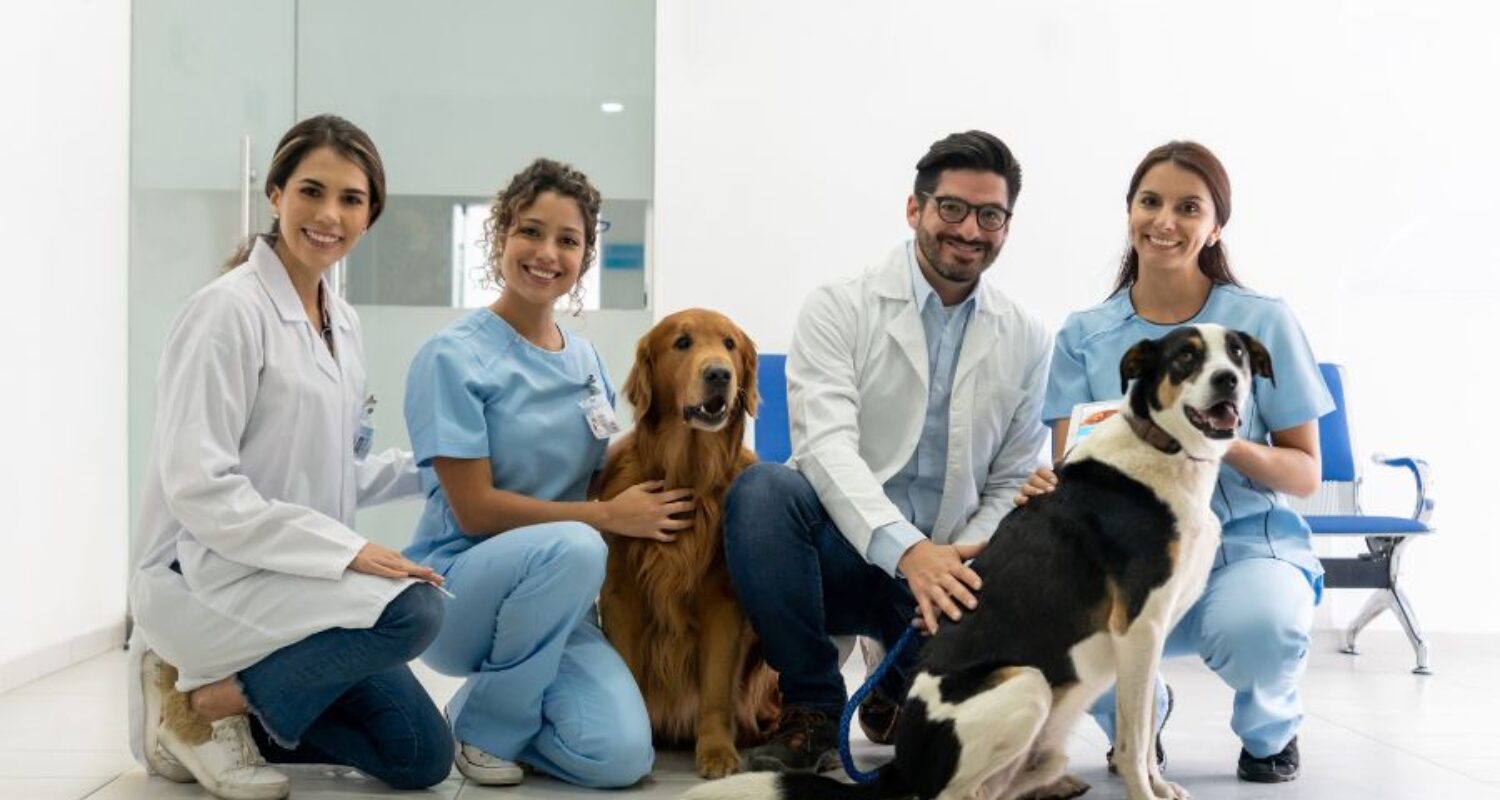In today’s world, 86% of people look online for local businesses, like vet clinics. This makes digital marketing key for reaching out to potential clients. With 80% of local searches leading to action, vets can’t ignore digital tools like web design and SEO.
The U.S. pet industry has grown a lot, with spending hitting $95.7 billion in 2019. This is up from $90.5 billion in 2018. Since 1988, there’s been an 11% rise in pet owners. So, the big question is: How can vets use digital marketing to boost their online presence and draw in more clients?
Key Takeaways
- Digital marketing offers a higher return on investment (ROI) compared to traditional advertising methods.
- Social media engagement can help build a loyal online community for veterinarians.
- Email marketing can improve client retention and encourage repeat visits through personalized messages.
- Local SEO is essential for veterinary practices to appear in local search results on platforms like Google My Business.
- Paid advertising through PPC can drive targeted traffic to a veterinary website by bidding on relevant keywords.

Why Digital Marketing Matters for Modern Veterinary Practices
There are between 28,000 to 32,000 veterinary practices in the United States. Digital marketing is key for vets to stand out. It helps them reach pet owners effectively.
Understanding the Online Pet Owner Journey
Pet owners now look online for vet services and reviews. Vets with a strong online presence can connect better with them.
Key Statistics That Drive Veterinary Marketing
- Vets on social media can reach new and current clients.
- SEO helps vets be seen more online by using the right keywords.
- Digital ads can attract more pet owners and grow the business.
Setting Clear Marketing Goals for Your Practice
Clear goals are vital for a vet’s digital strategy. They help focus efforts and measure success. Goals might include more website visits or bookings.
| Marketing Tactic | Potential Impact |
|---|---|
| Social Media Campaigns | Engage with existing clients and reach new potential customers |
| Pay-Per-Click Advertising | Target specific demographics and track the ROI of online campaigns |
| Content Creation | Showcase expertise and differentiate the practice from competitors |
Understanding pet owners online, knowing key stats, and setting goals to help vets succeed. A good digital strategy can drive growth and success.
Building a Professional Veterinary Website
We know how vital it is to give top-notch care to pets. But today, having a great website is just as important. It shows off our services and skills. A professional website is key to our veterinary online marketing success, helping us connect with local pet owners.
First impressions are everything. Studies say people decide if they like a website in just a second. With most people using phones to browse, making sure our site works well on mobile is crucial.
Our website should be easy to use and have clear calls to action. This helps pet owners book visits or learn more about us. Adding testimonials and reviews can also build trust and boost pet clinic advertising.
Keeping our branding consistent is vital for looking authentic and trustworthy. Offering discounts or special deals can also draw in more clients.
In the end, a well-made veterinary website is the base of our digital marketing plan. By focusing on user experience, SEO, and content, we can better connect with our community. This sets our practice up for success in the long run.
Digital Marketing for Veterinarians: Essential Strategies
For a modern vet practice, digital marketing is key to standing out. It’s about having a strong online presence and measuring success. It also means using resources wisely to grow and connect with pet owners.
Creating a Comprehensive Online Presence
A professional, mobile-friendly website is the first step. It should highlight your services and team. Use keywords to help pet owners find you online.
Adding features like online booking and client portals makes your site better. It improves the user experience.
Measuring Marketing Success and ROI
It’s vital to track your digital marketing performance. Look at website traffic, lead generation, and bookings. This helps you see what’s working and what’s not.
By monitoring your return on investment (ROI), you can make better choices. This way, you can focus on what brings the most value.
Budgeting for Digital Marketing
Creating a budget for digital marketing is essential. Consider costs for website upkeep, SEO, PPC ads, social media, and email marketing. Balancing digital and traditional marketing helps you reach more people.
By using these digital marketing strategies, vet practices can grow online. They can measure success and use resources well. This attracts new clients and builds loyalty.
Local SEO Optimization for Veterinary Practices
As a modern vet, using local SEO is key to drawing in new pet owners. Most local searches happen on mobiles, so your site must work well on all devices. A 50-point checklist for on-page SEO can boost your site’s ranking and bring more visitors.
Social media and blogging are also important for local SEO. Sharing useful content helps you connect with your community and shows you’re a trusted pet care source. Companies that blog get 97% more links, which helps their search rankings.
Managing your reputation online is vital. 85% of people trust online reviews as much as personal ones. Responding to reviews helps build trust with pet owners, especially as more people use tech to find vet services.
Good local SEO strategies can make your vet practice more visible online. This can lead to more people calling for appointments. Plus, SEO can save you money by reducing the need for expensive ads.
Local SEO is an ongoing effort. Keep up with new trends and best practices to stay visible to your community.
Social Media Marketing for Pet Care Services
In today’s world, social media is a key tool for vets to reach pet owners. It helps increase visibility. By using Facebook, Instagram, and Twitter wisely, you can connect with your audience and grow your pet care services.
Choosing the Right Social Platforms
Not all social media platforms are the same for vets. It’s crucial to pick the ones where you can best connect with pet owners. Here are some top choices:
- Facebook: Great for sharing photos and starting discussions on pet health.
- Instagram: Perfect for showing off your practice’s personality with beautiful images.
- Twitter: Good for quick updates and sharing short pet care tips.
- Pinterest: Useful for sharing infographics and guides on pet care.
- YouTube: Ideal for creating informative pet health videos.
Content Strategy for Pet Healthcare
Creating a good content strategy is essential. Mix educational, fun, and promotional content that interests your audience. Here are some ideas:
- Show behind-the-scenes of your practice and staff.
- Share pet care tips and advice.
- Highlight success stories and client testimonials.
- Promote special offers and new services.
- Use photos from clients to build a community.
Engaging with Pet Owners Online
Good social media marketing for vets is about more than just posting. It’s about talking to your audience. Reply quickly to comments and messages, and start conversations. Use live videos, polls, and contests to connect with pet owners and keep them interested in your practice.
| Social Media Metrics | Benchmark for Veterinary Practices |
|---|---|
| Posts per week | 3-5 |
| Engagement rate | 1-3% |
| Response time to messages | Within 24 hours |
By using social media, you can build stronger bonds with pet owners. Show your expertise and grow your veterinary business.
Email Marketing and Client Communication
As veterinary professionals, we know how key it is to keep in touch with our clients. Email marketing is a great and affordable way to do this. It offers a big return on investment, with an average of $44 for every $1 spent.
We can send personalized messages, reminders, updates, tips, and fun animal content via email. Making emails easy to read on phones, writing catchy subject lines, and using automation can boost our campaigns. This helps us connect better with pet owners.
Studies show that 49% of clients want weekly emails from their vet. We can send special offers and tips by segmenting our lists. Also, linking our social media can help us get more email addresses and reach more pet owners.
| Email Marketing Statistics for Veterinary Practices | Value |
|---|---|
| Increase in email revenue from segmented campaigns | 760% |
| Pet owners who would take action on email content from their veterinarian | 70% |
| Pet owners who prefer brands to contact them via email | 61% |
| Email open rate in the animal and pet service industry | Highest of any industry |
Email marketing helps us get new clients and keep the ones we have. Personalized emails for reminders and follow-ups make a good first impression. They also help us keep our practice in mind and improve our online reputation.
Email marketing is a key part of our digital strategy. It’s a cost-effective way to engage with pet owners, increase website traffic, and grow our practice. By keeping up with email marketing trends, we can make our veterinary email campaigns and pet owner outreach more effective.

Pay-Per-Click Advertising for Veterinarians
Pet owners are now more likely to find vet services online. Pay-per-click (PPC) ads are key for vets to reach them. They help vets target local pet owners, offering quick results and a market edge.
Google Ads Strategy for Vet Practices
Google Ads is a top choice for vets to boost their online presence. By setting up targeted campaigns and optimizing landing pages, vets can draw in new clients. It’s important to consider geo-targeting, ad timing, and lead tracking for effective ads.
Social Media Advertising Campaigns
Vets can also use social media for ads. Facebook, Instagram, and LinkedIn are best for their reach and targeting. Social media ads help vets connect with pet owners and show their pet care skills.
Target Audience Segmentation
Understanding the target audience is crucial for vetting PPC campaigns. By segmenting based on location, pet ownership, and care needs, vets can tailor ads. This approach boosts the return on investment from PPC ads.
| Platform | Key Benefits for Veterinary Practices |
|---|---|
| Google Ads | Precise targeting, immediate results, competitive edge, tracking and optimization |
| Social Media Ads | Reach, targeting options, engagement with pet owners, showcasing expertise |
PPC ads can be a game-changer for vets. They help attract new clients, boost website traffic, and grow the business. Working with a top pet clinic advertising agency like TheeDigital can help vets stay competitive in the animal hospital promotion world.
Visual Content and Online Reputation Management
Today, pet owners often look online to find vet services. Visual content and managing our online image are key. At our vet clinic, we know how important these are for connecting with clients and earning their trust.
Harnessing the Power of Visual Content
Visuals like patient stories, educational videos, and fun social media posts are vital. They help us show what we do and connect with our clients. By using these in our online world, we grab the attention of those looking for vet care.
- Patient testimonials on our site build trust, as 88% of consumers trust online reviews as much as personal recommendations.
- Our educational videos make us seem like experts in pet care and vet procedures.
- Our social media posts, like before-and-after photos, leave a lasting, positive impression.
Proactive Online Reputation Management
Managing our online image is crucial today. We watch reviews on different sites, answering both good and bad feedback quickly and well. This way, we show we care about our clients and keep our reputation strong.
| Platform | Key Considerations |
|---|---|
| Yelp | Focus on solving issues with customer service and communication. |
| Social Media | Create content that engages clients and meets their pet care needs. |
| Practice Website | Ask for feedback and testimonials to increase credibility. |
By using visual content and actively managing our online image, we become a trusted vet clinic. This approach to digital marketing brings in new clients, keeps current ones, and ensures our patients get the best care.
Conclusion
Digital marketing is key for veterinary practices to grow and succeed today. A good strategy includes a professional website, local SEO, social media, email campaigns, PPC ads, and managing online reviews. This helps attract more clients, build strong relationships, and reach more people.
Being consistent in our marketing, using the latest tech, and checking our strategies often are important. Digital tools help us connect with pet owners, offer great service, and make our practice the top choice for pet care in our area.
The digital world keeps changing, so we must stay up-to-date and adjust our plans. By using the strategies from this article, we’re sure our veterinary practice will do well online. We aim to give the best care to our furry friends.
FAQ
Why is digital marketing essential for veterinary practices?
Today, 86% of people look for local businesses online, including vet clinics. With 80% of local searches leading to action, digital marketing is key for vets to reach clients online.
What are the key digital marketing strategies for veterinarians?
Vets need web design, SEO, PPC ads, email marketing, social media, and CRO. These strategies help them grow online.
How important is local SEO for veterinary practices?
Local SEO is vital for vets to show up in local searches. Use location keywords, ensure accurate listings on Google Business Profile and Yelp, and reply to online reviews.
What is the role of social media in veterinary marketing?
Social media helps vets connect with clients and raise awareness. Use Facebook, Instagram, Twitter, Pinterest, and YouTube. Share pet photos to boost engagement.
How effective is email marketing for veterinary practices?
Email marketing is very effective and affordable for vets. It offers a high return, for every.
FAQ
Digital Marketing for Veterinarians: Why It’s Essential for Practice Growth
Today, 86% of people look for local businesses online, including vet clinics. With 80% of local searches leading to action, digital marketing is key for vets to reach clients online.
What are the key digital marketing strategies for veterinarians?
Vets need web design, SEO, PPC ads, email marketing, social media, and CRO. These strategies help them grow online.
How important is local SEO for veterinary practices?
Local SEO is vital for vets to show up in local searches. Use location keywords, ensure accurate listings on Google Business Profile and Yelp, and reply to online reviews.
What is the role of social media in veterinary marketing?
Social media helps vets connect with clients and raise awareness. Use Facebook, Instagram, Twitter, Pinterest, and YouTube. Share pet photos to boost engagement.
How effective is email marketing for veterinary practices?
Email marketing is very effective and affordable for vets. It offers a high return, with $44 for every $1 spent. Use it for personalized messages, reminders, updates, and fun animal content.
How can pay-per-click (PPC) advertising benefit veterinary practices?
PPC ads are cost-effective, with an average ROI of $2 for every $1 spent. They can appear at the top of search results and target specific audiences.
Why is visual content important for veterinary marketing?
Visual content grabs attention and showcases services. Include patient testimonials to build trust, as 88% trust online reviews as much as personal recommendations.
Spent. Use it for personalized messages, reminders, updates, and fun animal content.
How can pay-per-click (PPC) advertising benefit veterinary practices?
PPC ads are cost-effective, with an average ROI of for every
FAQ
Why is digital marketing essential for veterinary practices?
Today, 86% of people look for local businesses online, including vet clinics. With 80% of local searches leading to action, digital marketing is key for vets to reach clients online.
What are the key digital marketing strategies for veterinarians?
Vets need web design, SEO, PPC ads, email marketing, social media, and CRO. These strategies help them grow online.
How important is local SEO for veterinary practices?
Local SEO is vital for vets to show up in local searches. Use location keywords, ensure accurate listings on Google Business Profile and Yelp, and reply to online reviews.
What is the role of social media in veterinary marketing?
Social media helps vets connect with clients and raise awareness. Use Facebook, Instagram, Twitter, Pinterest, and YouTube. Share pet photos to boost engagement.
How effective is email marketing for veterinary practices?
Email marketing is very effective and affordable for vets. It offers a high return, with $44 for every $1 spent. Use it for personalized messages, reminders, updates, and fun animal content.
How can pay-per-click (PPC) advertising benefit veterinary practices?
PPC ads are cost-effective, with an average ROI of $2 for every $1 spent. They can appear at the top of search results and target specific audiences.
Why is visual content important for veterinary marketing?
Visual content grabs attention and showcases services. Include patient testimonials to build trust, as 88% trust online reviews as much as personal recommendations.
Spent. They can appear at the top of search results and target specific audiences.
Why is visual content important for veterinary marketing?
Visual content grabs attention and showcases services. Include patient testimonials to build trust, as 88% trust online reviews as much as personal recommendations.




